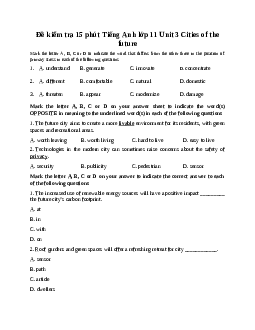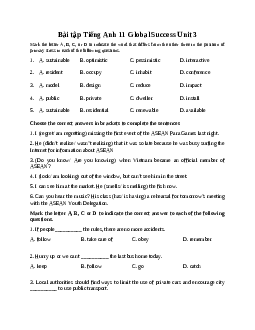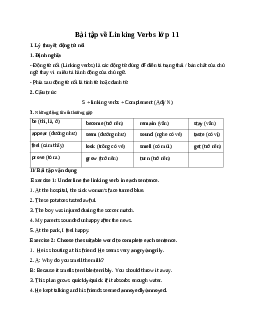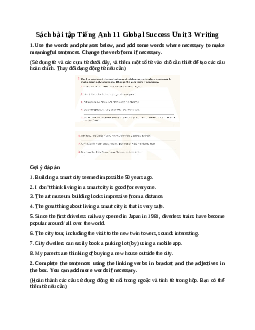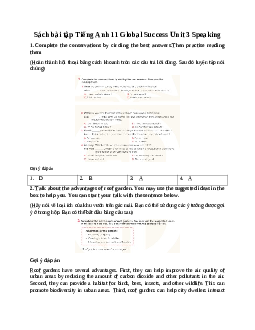



Preview text:
Tiếng Anh 11 Global Success Unit 3 Speaking
Discussing cities in the future
(Thảo luận về các thành phố trong tương lai)
1. Work in pairs. Complete the diagram with the ideas below.
(Làm việc theo cặp. Hoàn thành sơ đồ với những ý tưởng dưới đây.) Gợi ý đáp án 1. B 2. C 3. A
2. Match the questions with the answers to make a conversation. Then practice it in pairs.
(Nối các câu hỏi với các câu trả lời để tạo thành một đoạn hội thoại. Sau đó thực hành nó theo cặp.) Gợi ý đáp án 1. a 2. c 3. b Lời giải chi tiết 1 - c
What do you think transport will be like in the cities of the future?
(Bạn nghĩ phương tiện giao thông sẽ như thế nào ở các thành phố trong tương lai?)
Well, I think there will be no private vehicles in the cities.
(Ồ, tôi nghĩ sẽ không còn phương tiện cá nhân trong thành phố nữa.) 2 - a
So, how will people travel in the city?
(Vậy mọi người sẽ đi lại trong thành phố như thế nào? - Chà, tôi nghĩ sẽ không có
phương tiện cá nhân trong thành phố.)
They will use public transport instead of their own vehicles.
(Họ sẽ dùng phương tiện công cộng thay vì những phương tiện cá nhân.) 3 - b
Really? Why do you think public transport will be popular with city dwellers?
(Thật sao? Tại sao bạn nghĩ phương tiện giao thông công cộng sẽ phổ biến với cư dân thành phố?)
Because technology will make public transport faster, more convenient, and more eco- friendly.
(Vì công nghệ sẽ giúp giao thông công cộng nhanh hơn, tiện lợi hơn và thân thiện với môi trường hơn.)
3. Work in pairs. Ask and answer questions about one of the features of future cities
in 1. Use the model and the tips in 2 to help you.
(Làm việc theo cặp. Hỏi và trả lời các câu hỏi về một trong những đặc điểm của các thành
phố trong tương lai trong phần 1. Sử dụng mô hình và các mẹo trong phần 2 để giúp bạn.) Gợi ý đáp án TRANSPORT (GIAO THÔNG)
1. Do you think people will still own cars in the cities of the future?
I don't think so. Private vehicles will be replaced by more efficient and sustainable public transport systems.
2. How will public transport be different in the future cities?
Public transport will be faster, more frequent, and more comfortable. It will also be
controlled by computers and use eco-friendly technologies.
3. What kind of eco-friendly technologies will be used in future transport systems?
There will be electric buses, trains, and trams that produce no or low emissions. There
will also be more bike lanes and walkable streets to encourage active modes of transport.
4. How will people pay for public transport in the future?
People will use smart cards or mobile apps to pay for their journeys. The fare system will
be more integrated and offer discounts for regular users.
INFRASTRUCTURE (HẠ TẦNG)
1. How will the street infrastructure be different in the future cities?
The street infrastructure will be smarter with more sensors and data collection devices.
This will enable faster and better decision-making for traffic management, waste
collection, and other services.
2. Will there be more green spaces in the future cities?
Yes, there will be more green spaces and parks in the future cities to improve the quality
of life and mitigate the effects of climate change. The green spaces will also provide
habitats for wildlife and help reduce the urban heat island effect.
3. How will the buildings be designed in the future cities?
The buildings will be designed to be more energy-efficient and eco-friendly. They will
have green roofs, solar panels, and rainwater harvesting systems to reduce the energy
consumption and carbon footprint. The buildings will also be equipped with smart
technologies to optimize the use of resources and improve the indoor environment.
LIVING CONDITIONS (ĐIỀU KIỆN SỐNG)
1. How will technology improve people's lives in the future cities?
AI technologies will help people do many daily activities, such as cooking, cleaning, and
shopping. For example, smart refrigerators will order groceries when they run low, and
robots will clean the house while the residents are at work.
2. Will there be more green spaces in the future cities?
Yes, there will be more green spaces and parks in the future cities to improve the quality
of life and reduce pollution. The green spaces will also provide habitats for wildlife and
help reduce the urban heat island effect.
3. What will be the impact of green skyscrapers on the living conditions in the future cities?
Green skyscrapers will replace old blocks of flats and offices in crowded urban centers.
They will provide cleaner air, more natural light, and better insulation than traditional
buildings, which will improve the quality of life for the residents.
4. How will the public services be improved in the future cities?
Public services such as healthcare, education, and social services will be more accessible
and efficient in the future cities. Smart technologies will help people schedule
appointments, receive personalized care, and connect with social networks.
5. Will people still need to commute to work in the future cities?
Yes, people will still need to commute to work, but the commuting time will be shorter
and more comfortable. Public transport will be faster and more reliable, and some people
may also be able to work remotely from home or from shared workspaces.
4. Work in groups. Discuss what the cities of the future will be like and present your
groups’ ideas to the whole class.
(Làm việc nhóm. Thảo luận về các thành phố trong tương lai sẽ như thế nào và trình bày
ý tưởng của nhóm bạn trước cả lớp.) Gợi ý đáp án
The cities of the future will be different from the cities of today. They will be more
advanced and sustainable, with green buildings and eco-friendly public transport. People
will not need to use their own cars because the city infrastructure will be designed to
support public transportation. The cities of the future will have smart technologies to
make people's lives easier, such as AI assistants that can help with daily tasks. Overall,
the cities of the future will prioritize the well-being of the environment and the people who live in them.
